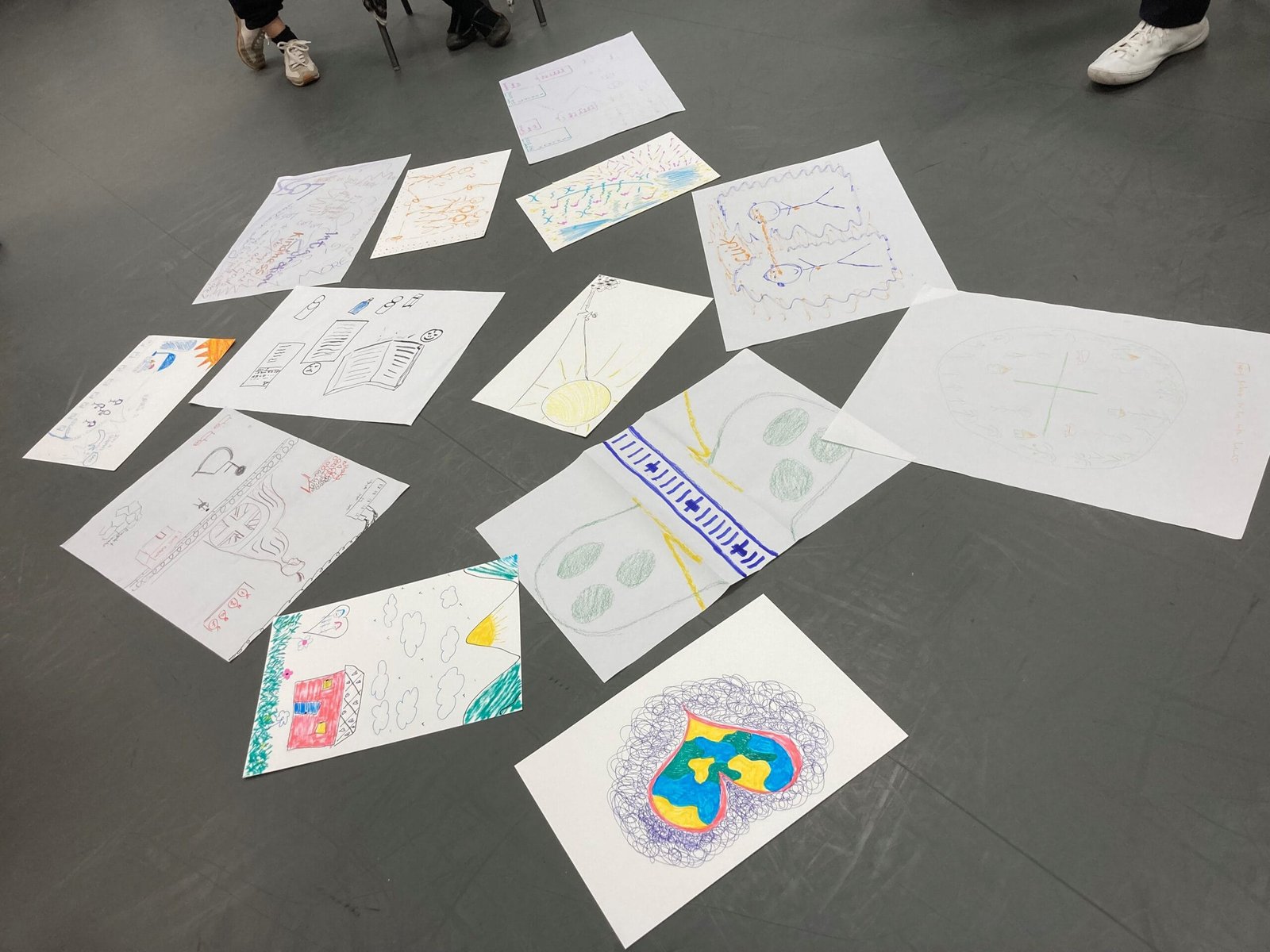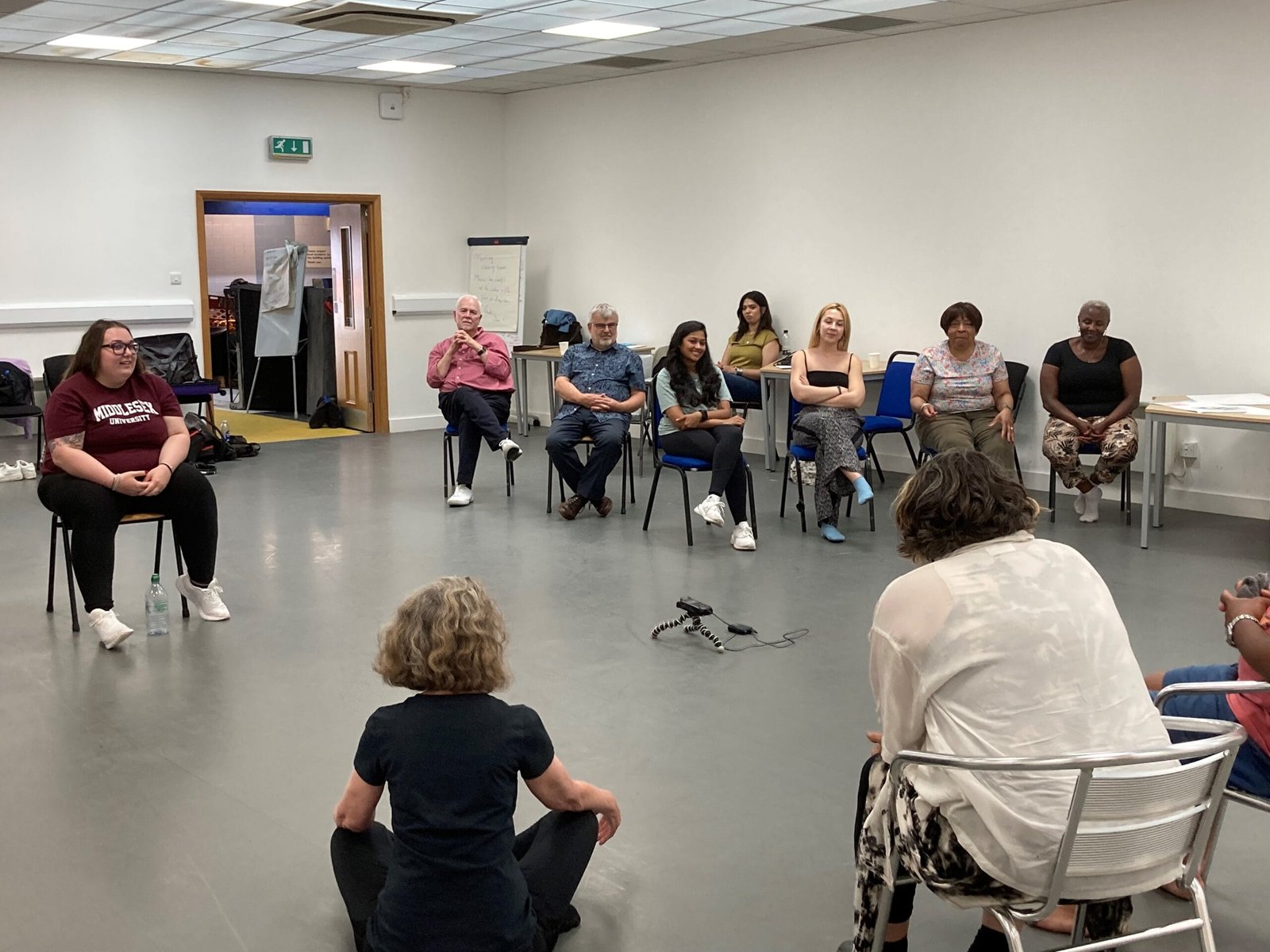
Two participants’ perspectives about the Knowledge Exchange Workshop “Learn to Love Being with Less” held on 15th June 2022.
This workshop, using a range of arts activities including somatic movement and dance, took place at the Bathway Theatre in Woolwich London to explore the question: “How can we learn to love being with less?”
The workshop was organised by a team of five people from academia, a dance CIC and independent freelancers. It was financed by the University of Greenwich’s Innovation Fund as part of the Practice as Research and Knowledge Exchange (PARKE) initiative.
The workshop’s participant selection ensured two conditions were met. Firstly, to have a diverse range of participants from different socio-economic backgrounds, educational experience, ethnicities and age range. Secondly, to include participants who lead community groups and therefore could apply their learning from the workshop to their own community groups. In total, 15 participants attended.
The workshop aimed to address UN Sustainable Development Goal 11 - sustainable cities and communities - by exploring the theme “love being with less”. Participants were guided through the day by two professional facilitators who encouraged everyone to express their own ideas and feelings on the topic as well sharing and exchanging ideas with other participants. The approach to the varied activities was based on dance and movement to music and with Paul Loper’s chormmunity methodology (Ref Loper) involving somatic movement, images, and words to express feelings and thoughts. The workshop provided opportunities to explore the theme and served at the same time as a role model for the facilitation of a diverse group of participants who were unknown to one another. Elicited participant feedback at the end of the workshop highlighted the benefits of working in diverse groups. Organisers of the workshop expected this type of knowledge exchange to be particularly beneficial for community group leaders to take home. The workshop has also provided a successful way of working that can be explored and developed for similar workshops in the future. Ideally, this will provide further opportunities for intergenerational collaborations across arts organisations, independent artist- facilitators, community groups and academia.
Dr Marianne Markowski, was one of the organisers and a participant in the workshop. She was completely new to the somatic approach of co-creation and knowledge exchange. Marianne shares her perspective as follows:
“It was a totally refreshing and uplifting day for me. I haven’t danced liked this in ages, nor would I have ever dreamed of ‘dancing a picture’. My world mainly consists of looking at screens, reading or writing. I couldn’t believe how well I connected with other participants whom I did not know before the workshop and how we were able to create a story dance, which was called ritual in this context. The highlights for me in this day were around the active listening exercise with my partner and how this resulted in a honest and deeply meaningful conversation of what is important to us. This was then reflected by our ‘mark making’ [drawing], and then the whole group sorted the pictures in piles with everybody having an input. Another lesson I learnt is how much of a difference expressing yourself with the body makes when we explore the meaning of ‘things’. Although we did not develop many practical tips to the question how to learn to love being with less, it did give me a feeling of hope and encouragement that we can share the same values and that we can protect our planet together when we all work together.”

Dr Jaqueline Richards was also one of the workshop organisers. She is over 30 years senior to Marianne. Jaqueline has extensive experience with older people’s creative dance. She left her fulltime management career in 2008 to return to dance and community activities and the last 13 years have been beyond all expectations involving founding and managing a local dance organisation, performing and advising organisations about ageism, language and stereotyping; as well as achieving a work-based doctorate “Active Older People Participating in Creative Dance – challenging perceptions”.
Jaqueline describes her perspective of the day as follows:
“I was interested to find out how an intergenerational group of diverse people would participate in a multi-arts workshop where they would be taken out of their comfort zones. The workshop was a real opportunity to find new ways to collaborate and find different ways of working together. The highlights for me included seeing how small intergenerational groups could create meaningful rituals that they were fully committed to and expressed their common understanding of the topic they had chosen. Although, some had never danced and moved, drawn or written in these ways before they were totally absorbed and fully committed. Their rituals were meaningful and had been devised in short amounts of time and were performed to the whole group. Another highlight was hearing a participant’s story about fears she had before attending as she was not an academic, but the day had made her realise that she had other skills and knowledge to share. She had enjoyed the workshop experience, it had given her confidence. Similarly, some of the academics reflected on new awareness and having been taken out of their comfort zones, participating in a workshop that was not just discussing ideas and communicating only in words. I came away hopeful that there could be new ways of bringing individual members of community groups, academics and arts facilitators closer together to explore important topics to bring about change and sharing knowledge. Dance and movement have so much to offer such as creativity, social inclusion and friendship, health and wellbeing and spirituality. I hope this workshop is the beginning of further worthwhile exploration and contributing towards creating a better world locally and beyond.”
The meetings to organise the workshop were held online to reduce our carbon footprint. Participants were encouraged to arrive at the Bathway theatre by public transport and were asked to bring their own lunch as this was seen more in-line with the UN Sustainable Development Goal 11. In return for people’s expertise and time for the workshop, the organisers provided a £30 incentive and £10 towards Travel cost. One of the participants (in the 64-71 years age bracket) wrote afterwards to everyone who was involved in organising the workshop “thank you for inviting me and for a truly inspirational day.”
The day has been fully documented by video recording and we expect to release a short movie capturing salient moments of the day in the next couple of months.
If you have any questions, please contact: Marianne Markowski on a.m.markowski@greenwich.ac.uk
Or Jaqueline Richards on jackie@jac.dance
You can find more information on Jaqueline on her website: www.jackie.jac.dance
Loper, P. (2000). Chormmunity: Co-Creating Embodied Community.
Image credit: Marianne Markowski
__________________________________
This workshop was financed by the University of Greenwich’s Innovation Fund as part of the Practice as Research and Knowledge Exchange (PARKE) initiative which looks to open up ways in which multiple types of stakeholders might come together to identify new practice-based research and Knowledge Exchange projects. You can read more about this project in our blog Practice as Research and Knowledge Exchange Café’s (PARKE): Methodologies to connect beyond academia.
